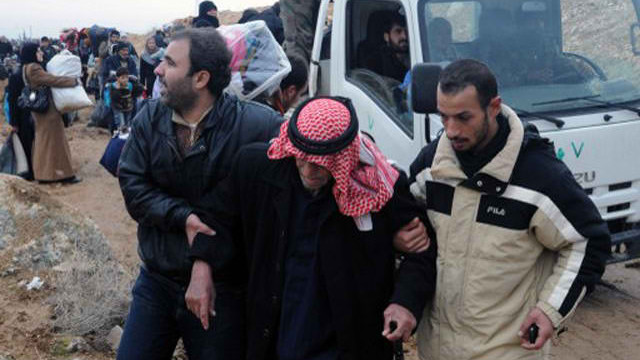SUMMARY
This is AI generated summarization, which may have errors. For context, always refer to the full article.

KUWAIT CITY, Kuwait – The United Nations, facing its “worst humanitarian crisis” in decades, is seeking a whopping US$6.5 billion (4.7 billion euros) to aid Syrians affected by war at a donor’s conference in Kuwait City on Wednesday, January 15.
The UN has described the appeal as the largest ever in its history for a single humanitarian emergency.
UN Secretary General Ban Ki-Moon will chair the one-day ministerial-level Second International Pledging Conference for Syria, which will be opened by Kuwait’s Emir Sheikh Sabah al-Ahmad al-Sabah.
UN Secretary General and Regional Humanitarian Coordinator Nigel Fisher has told Kuwait’s official KUNA news agency that the funds will be used to aid some 13.4 million Syrians whom the United Nations estimates will be affected by the Syrian civil war by the end of 2014.
The figure is higher than the original 10 million people announced by the United Nations 7 months ago.
The United Nations will need $2.3 billion to support 9.3 million people inside Syria and $4.2 billion for Syrian refugees, expected to nearly double to 4.1 million by year’s end, the UN official said.
The World Food Programme said it was stepping up food aid and would also provide supplements to around 240,000 toddlers aged 6-23 months, to ensure they do not suffer from malnutrition.
“This is the worst humanitarian crisis that we have seen in decades, with every day more vulnerable Syrians pushed into hunger,” said WFP Syria emergency coordinator Muhannad Hadi last month.
The donors conference comes just a week before the so-called ‘Geneva II’ peace meeting aimed at finding a political solution to the 34-month conflict, which has claimed 130,000 lives.
The Swiss talks have been organized in an attempt to revive a long-stalled framework for peace involving a cessation of hostilities and the creation of a national transitional government that could involve figures from the current regime and the opposition.
Ahead of his arrival in Kuwait City, Ban warned that the humanitarian situation in Syria has been deteriorating and called on donor nations to help meet the target.
The situation has reached a “very serious… and critical” level, Ban said in an interview with KUNA.
“Almost half the population has been affected… 40% of the hospitals have been destroyed and another 20 percent not functioning properly. This is a very sad situation.
“I sincerely hope that member states will come (to the Kuwait Conference) with generous helping hands” for the Syrian people inside and outside the country, he said.
UN humanitarian operations chief Valerie Amos said in a statement ahead of the conference that the money would be used to assist civilians affected by the civil war.
“In mid-December we launched the largest ever appeal for a single humanitarian emergency,” Amos said.
“We requested $6.5 billion. We are doing our utmost to support the children, women and men affected by this bloody conflict. The funding that we need is unprecedented,” she said.
The first donors conference in Kuwait in January last saw participating nations pledge $1.5 billion but only around 75% of the pledges were fulfilled, according to a Kuwaiti official.
Ban has affirmed to KUNA that the UN is experiencing “serious funding gaps.”
According to aid agencies, 10.5 million Syrians are food insecure or severely food insecure, over a million children under five suffer from acute or severe malnutrition, about half the population has no access to adequate water sources or sanitation facilities and 8.6 million have insufficient access to healthcare.
Lebanon is currently home to the largest number of refugees with 905,000, followed by Jordan with 575,000, Turkey 562,000, Iraq 216,000 and Egypt 145,000.
By the end of 2014, these numbers are estimated to rise to 1.65 million in Lebanon, 800,000 in Jordan, 1.0 million in Turkey, 400,000 in Iraq and 250,000 in Egypt. – Rappler.com
Add a comment
How does this make you feel?
There are no comments yet. Add your comment to start the conversation.